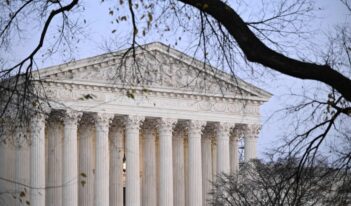
The Supreme Court should uphold longstanding legislation protecting the neutrality of administrative law judges.
This term, the U.S. Supreme Court will hear SEC v. Jarkesy and decide whether the Constitution requires agencies to use biased judges to adjudicate cases.
As background, the U.S. Securities and Exchange Commission (SEC) brought an enforcement action over a decade ago against an investment advisor named George Jarkesy. An SEC administrative law judge (ALJ) then determined that Jarkesy had committed securities fraud. Jarkesy persuaded the U.S. Court of Appeals for the Fifth Circuit to hold that the SEC decision was unconstitutional because the ALJ who presided over the hearing in his case could only be removed “for cause.” The U.S. Supreme Court now must decide whether to uphold the SEC’s decision or the Fifth Circuit’s.
As Alan Morrison points out, Jarkesy’s sole interest is to avoid the adverse effects of the SEC’s decision on him. He has no interest in the adverse effect of a Supreme Court decision in his favor on the millions of other people who adjudicate cases before agencies every year. The Supreme Court should care about that latter effect, but it is not clear that it will even consider it in the process of deciding the case.
A decision in favor of Jarkesy would force every agency that conducts adjudications to use judges who are biased against the private parties who appear before them. Understanding why this is so requires reviewing an important chapter in the history of administrative law.
In the 1930s, private parties who participated in hearings conducted by agencies complained that the judges who presided over agency hearings were biased against them and in favor of the agency where the judges presided. Some studies at the time supported the widespread complaints of bias.
After many years of study and debate, Congress responded to those complaints in 1946 by enacting the Administrative Procedure Act (APA). The APA includes five provisions that assure that agencies cannot use managerial tools to induce one important class of agency adjudicators—ALJs—to conduct hearings in ways that favor the agency. Agencies can play no role in determining an ALJ’s compensation; they must assign cases to each ALJ in rotation; they cannot assign an ALJ responsibilities inconsistent with their roles as adjudicators; they cannot subject an ALJ to supervision by any agency employee who engages in investigation or enforcement; and, most importantly, agencies cannot remove or otherwise discipline an ALJ except for cause as determined by the U.S. Merit Systems Protection Board after a formal hearing.
In its decision in Jarkesy, the Fifth Circuit relied on the Supreme Court’s opinion in Free Enterprise Fund v. Public Company Accounting Oversight Board as the basis for its holding that the for-cause limit on the power of the SEC to remove an ALJ is unconstitutional. In Free Enterprise Fund, the Supreme Court held that it is unconstitutional for Congress to provide two layers of for-cause insulation between the President and an officer who has the power to make policy decisions on behalf of the United States. The Court went on to hold that the for-cause limit on the SEC’s power to remove Public Company Accounting Oversight Board members was unconstitutional.
The Supreme Court’s decision in Free Enterprise Fund does not support the Fifth Circuit’s decision to force all parties to agency adjudications to have their cases adjudicated by biased decision-makers. In its opinion in Free Enterprise Fund, the Court specifically reserved the issue of the validity of the for-cause limit on the power of an agency to remove an ALJ for sound reasons.
ALJs are easy to distinguish from the Board members whose tenure was challenged in Free Enterprise Fund. The Board members are policymakers, while ALJs perform solely adjudicative functions and have no power to make policy decisions.
When Congress enacted the APA, it included two provisions that ensure that agencies retain complete control over the legal basis and policy content of any decision in an adjudication. First, it recognized that agencies have the power to make rules that bind ALJs. Second, it conferred on agencies the authority to substitute their decisions for those of ALJs.
ALJs are analogous to the members of the War Claims Commission who were the subject of the Supreme Court’s opinion in Wiener v. United States. The Court held that the members of the Commission could not be removed except for cause because they performed solely adjudicative functions. The analogy between the Commission members in Wiener and ALJs is so compelling that the Court would have to overrule Wiener to hold that the for-cause limit on the power to remove an ALJ is unconstitutional.
If the Supreme Court decides that it must eliminate one layer of for-cause protection to enforce its decision in Free Enterprise Fund, it has a choice. It can either overrule Wiener or hold that the members of the SEC can be removed by the President without stating a cause. That should be an easy decision to make for two reasons.
First, there is no statutory for-cause limit on the power of the President to remove an SEC Commissioner. That limit was only implied by the Court in Free Enterprise Fund. By contrast, Congress explicitly prohibited an agency from removing an ALJ except for cause when it enacted the APA.
Second, like the members of the Board at issue in Free Enterprise Fund, SEC members have the power to make policy decisions on behalf of the United States. By contrast, ALJs are like the members of the War Claims Commission at the heart of Wiener. ALJs have only the power to preside in adjudications and no power to make any policy decision. Their insulation from removal by the SEC except for cause does not impair the President’s power to take care that the law is faithfully executed. Instead, it protects the due process rights of parties who adjudicate cases at agencies.
The Supreme Court should reject the Fifth Circuit’s decision and make it clear that the Constitution does not require biased administrative judges. On the contrary, due process under the Constitution requires neutral, unbiased administrative adjudicators.




